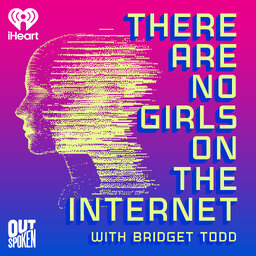Her Playboy picture changed the internet forever - Stuff Mom Never Told You
Even if you’ve never seen Lenna Forsén’s image, you know it, because an image of the Swedish former model went on to be one the most important images in internet history.
In 1 playlist(s)
There Are No Girls on the Internet
Marginalized voices have always been at the forefront of the internet, yet our stories often go over…Social links
Follow podcast
Recent clips

A TANGOTI Announcement We've Been Sitting On
47:34

Chris Pratt Is Hawking an Anti-Abortion Prayer App; Elon's Grok Is Doxxing Women; DOGE Bros Let ChatGPT Do Their Job; Trump’s Big DEI Loss – NEWS ROUNDUP
1:07:04

Satanic Panic of the 1980s Is Happening Again — This Time in Minnesota Daycares (w/ Sarah Marshall)
51:40
 There Are No Girls on the Internet
There Are No Girls on the Internet